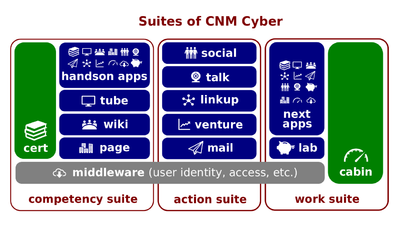Difference between revisions of "What Report Complete Is"
| Line 1: | Line 1: | ||
| − | [[File:Cnm-digital.png|400px|thumb|right|[[ | + | [[File:Cnm-digital.png|400px|thumb|right|[[CNMCyber suite]]s]][[What Report Complete Is]] (hereinafter, the ''Lectio'') is the [[lectio|lesson part]] of '''[[Technical Report Essentials]]''' [[lesson]] that introduces its participants to [[technical report]] concepts. This ''lesson'' belongs to the ''CNMCT Entrance'' section of [[CNMCyber Bootcamps]]. |
Latest revision as of 02:56, 21 October 2023
What Report Complete Is (hereinafter, the Lectio) is the lesson part of Technical Report Essentials lesson that introduces its participants to technical report concepts. This lesson belongs to the CNMCT Entrance section of CNMCyber Bootcamps.
Content
The predecessor lectio is What Reporting Is.
Script
- Report completeness is the degree to which a report includes all the reportable data that is requested by its recipient or required by law and is possible to obtain by the time of the report.
- Various question sets have been created to make sure that the reported data is complete. Rudyard Kipling established one set in a short poem,
I keep six honest serving men
(They taught me all I knew);
Their names are What and Why and When
And How and Where and Who.
- Collectively, the question words who, what, when, where, why, and how are sometimes called Kipling Questions. 5W1H can also be used since five of these question words start with W and one with H. When some data is missing, a complete report would mention that. For example,
The event timing is yet to be decided.
- Aristotle proposed the first known question set that also included the with what question. Thomas Aquinas summarized Aristotle's set in that way:
For in acts we must take note of who did it, by what aids or instruments he did it (with), what he did, where he did it, why he did it, how and when he did it.
- The other sets may include additional Ws and Hs for metadata like who reported, and a few other. Nevertheless, the report completeness doesn't assume that all imaginable questions are addressed.
- Report completeness assumes that the required, requested, and/or needed data is included. In the United States, for instance, the law establishes what financial reports any taxpayer must submit to IRS. These reports don't address how and why questions directly, but include income data at very least.
Key terms
- Report, reporting, reporter, reportable data, report completeness, question set, Kipling Questions, 5W1H
Closing
- Write True or False.
- In addition to the required, requested and/or needed data , report completeness assumes that all other imaginable questions are addressed.
The successor lectio is Narrated Fact vs Opinion.
